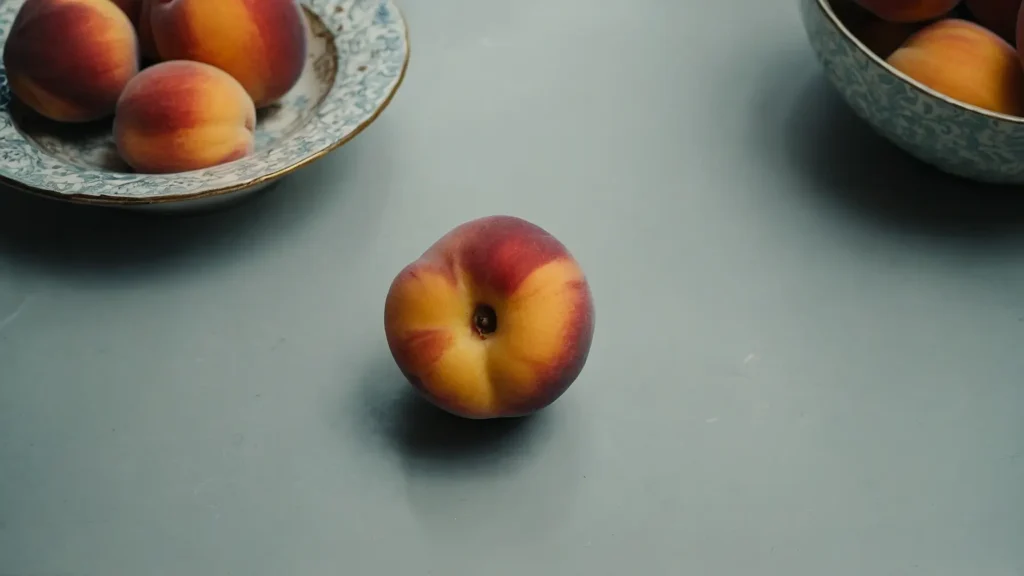Can Dogs Eat Peaches?

As dog owners, we’re always looking for ways to share our lives and, by extension, our meals with our furry companions. The sight of a dog eyeing a piece of fruit can bring joy and amusement, but it also raises an important question: Can Dogs Eat Peaches? Is it safe to share? Among the plethora of fruits available, peaches often find their way into our kitchens and potentially into the reach of our pets. With their sweet fragrance and juicy flesh, peaches can be tempting treats for dogs. However, it’s crucial to consider the nutritional benefits and potential risks associated with feeding peaches to dogs. This guide aims to provide dog owners with a balanced perspective on including peaches in their dog’s diet, along with insights into other fruits that may or may not be safe for canine consumption.
Is Peaches Good for Dogs?
Peaches are not only delicious but also packed with vitamins A and C, which are beneficial for a dog’s skin and immune system. Additionally, they are a source of fiber, which can aid in digestion and help prevent constipation in dogs. The antioxidants present in peaches can help fight free radicals, reducing the risk of chronic diseases and promoting overall health. Water content in peaches can also provide a refreshing, hydrating treat during hot summer days, making them a tasty way to help keep your dog hydrated.
However, moderation is key. Peaches should only be given as a treat and not make up a significant portion of a dog’s diet. The natural sugars in peaches, while not harmful in small quantities, can contribute to weight gain and other health issues if consumed in excess. Furthermore, it’s essential to prepare peaches safely by removing the pit and cutting the fruit into manageable pieces to avoid choking hazards and to prevent ingestion of any harmful substances.
Is Peaches Bad for Dogs?
Despite their benefits, there are several reasons to exercise caution when feeding peaches to dogs. The most significant risk comes from the peach pit, which contains cyanide, a toxic substance that can be harmful to dogs if ingested. Peach pits can also cause intestinal blockages or damage a dog’s teeth, posing serious health risks. Additionally, the skin of peaches may contain pesticides or other chemicals unless thoroughly washed or if the peaches are not organic.

Another consideration is the sugar content of peaches. While it’s natural sugar, excessive intake can lead to obesity, dental problems, and potentially diabetes in dogs, especially those that are already overweight or have underlying health conditions. It’s also possible for dogs to have an allergic reaction to peaches, though this is rare. Signs of an allergic reaction can include gastrointestinal upset, itching, or difficulty breathing, and require immediate veterinary attention.
Are Other Fruits Like Safe For Dogs?
When it comes to feeding dogs fruits other than peaches, each comes with its benefits and precautions. Bananas are safe for dogs in moderation, offering potassium, vitamins, fiber, and copper. They’re low in cholesterol and sodium but high in sugar, so they should be given as an occasional treat.
Cranberries are also safe for dogs and can support urinary tract health. However, they are acidic and can cause stomach upset in some dogs, so they should be introduced into the diet slowly and in small quantities.
Mango is another fruit that’s safe for dogs, containing vitamins A, B6, C, and E, along with potassium and beta-carotene. The pit should be removed due to the risk of choking and because it contains small amounts of cyanide.
Oranges can be given to dogs in small amounts. They’re an excellent source of vitamin C, potassium, and fiber, but their citric acid and sugar content mean they should be a rare treat.
Cherries, however, should be avoided. The flesh is safe, but the pits, leaves, and stems contain cyanide, posing a risk of toxicity. The small size of cherries also makes them a choking hazard.
Final Thoughts
In conclusion, while peaches can be a healthy treat for dogs in moderation, it’s essential to remove the pit and serve them in small, manageable pieces. The benefits of vitamins, fiber, and hydration must be weighed against the risks of cyanide poisoning from pits and potential gastrointestinal upset from overconsumption. When it comes to other fruits, bananas, cranberries, mango, and oranges can be safe in moderation, but cherries should be avoided due to their toxic pits. Always introduce new foods into your dog’s diet gradually and observe for any adverse reactions. Ultimately, a balanced diet tailored to your dog’s specific health needs and regular veterinary check-ups are crucial to ensure your furry friend’s long-term health and happiness. Sharing your life with a dog includes sharing meals, but it’s vital to do so with care and knowledge.










